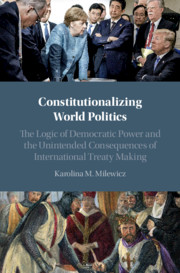 Constitutionalizing World Politics
Constitutionalizing World Politics Published online by Cambridge University Press: 21 July 2020
Chapter 1 reviews past scholarly ideals and political realities of a world constitution, focusing on the Covenant of the League of Nations and the Charter of the United Nations. It sketches out the core claims of the book according to which constitutional trends in world politics must be viewed with realistic skepticism and, in that light, can be understood in terms of a process called constitutionalization. This process does not generate the unified constitutional framework typically associated with national constitutions but manifests itself as an inadvertent by–product of piecemeal international treaty making driven by proximate objectives within issue–specific domains. The chapter then presents the major themes and limitations of the contemporary “constitutionalism beyond the state” debate and establishes how a social scientific perspective can add to this legal debate. It concludes with a preview of the book, emphasizing the main theoretical insights and empirical findings.
To save this book to your Kindle, first ensure no-reply@cambridge.org is added to your Approved Personal Document E-mail List under your Personal Document Settings on the Manage Your Content and Devices page of your Amazon account. Then enter the ‘name’ part of your Kindle email address below. Find out more about saving to your Kindle.
Note you can select to save to either the @free.kindle.com or @kindle.com variations. ‘@free.kindle.com’ emails are free but can only be saved to your device when it is connected to wi-fi. ‘@kindle.com’ emails can be delivered even when you are not connected to wi-fi, but note that service fees apply.
Find out more about the Kindle Personal Document Service.
To save content items to your account, please confirm that you agree to abide by our usage policies. If this is the first time you use this feature, you will be asked to authorise Cambridge Core to connect with your account. Find out more about saving content to Dropbox.
To save content items to your account, please confirm that you agree to abide by our usage policies. If this is the first time you use this feature, you will be asked to authorise Cambridge Core to connect with your account. Find out more about saving content to Google Drive.